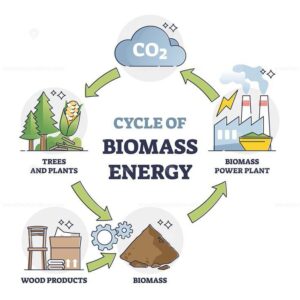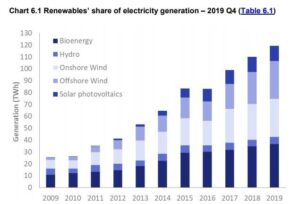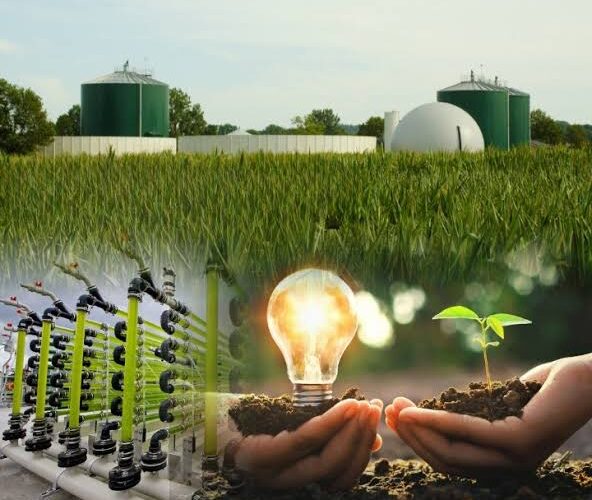The Rise of Biomass Energy in the United Kingdom
In the journey towards a sustainable energy future, the United Kingdom has embraced the potential of biomass energy as a crucial component of its renewable energy portfolio. As the country continues to make strides in reducing its carbon footprint and diversifying its energy mix, the role of biomass has become increasingly significant.
The Biomass Landscape in the UK
According to the latest data from the Department for Business, Energy & Industrial Strategy (BEIS), biomass energy accounted for 12.5% of the UK’s total renewable energy generation in 2022. This represents a steady growth from previous years, as the UK government has implemented policies and incentives to encourage the development of biomass-based power and heat generation.
The Biomass Fuel Mix
The biomass fuel mix in the UK is diverse, encompassing a range of feedstocks. The BEIS report on Renewable Energy Statistics highlights that in 2022, the primary biomass fuels used were:
- Solid biomass: 61.2% of total biomass energy generation
- Waste biomass: 25.9% of total biomass energy generation
- Biogas: 12.9% of total biomass energy generation ^2
These figures demonstrate the UK’s efforts to utilize various biomass resources, ensuring a balanced and sustainable approach to biomass energy production.
Biomass Energy Generation Capacity

The growth in biomass energy generation has been accompanied by a steady increase in installed capacity. According to the Renewable Energy Planning Database (REPD) from BEIS, the total installed biomass capacity in the UK stood at 4.4 GW as of March 2023. This represents a significant expansion from the 3.8 GW of installed capacity recorded in 2019.
The Role of Biomass in the UK’s Energy Transition
As the UK strives to achieve its ambitious climate and renewable energy targets, biomass energy has emerged as a crucial component of the country’s energy transition strategy.
Contribution to Renewable Energy Targets
The UK’s commitment to renewable energy is reflected in its legally binding target to achieve net-zero greenhouse gas emissions by 2050. Biomass energy plays a vital role in this endeavor, as it contributes to the country’s overall renewable energy generation mix.
According to the BEIS Renewable Energy Statistics, biomass energy accounted for 12.5% of the UK’s total renewable energy generation in 2022. This percentage is expected to grow as the country continues to invest in biomass-based power and heat generation projects.
Biomass and the Circular Economy
The utilization of biomass energy in the UK aligns with the broader principles of the circular economy. By repurposing waste and residual biomass materials, the country can effectively divert these resources from landfills and incineration, reducing the environmental impact and promoting a more sustainable approach to waste management.
Biomass and Decarbonization

Biomass energy is considered a carbon-neutral or even carbon-negative energy source, as the carbon dioxide released during the combustion process is balanced by the carbon absorbed by the biomass during its growth. This characteristic makes biomass a valuable contributor to the UK’s decarbonization efforts, as it can help offset emissions from other energy sectors.
Challenges and Opportunities in the Biomass Energy Sector
While the UK’s biomass energy sector has experienced significant growth, it also faces a range of challenges and opportunities that will shape its future development.
Sustainability Concerns
One of the primary concerns surrounding biomass energy is the potential impact on land use and biodiversity. Ensuring the sustainable sourcing of biomass feedstocks is crucial to mitigate any negative environmental consequences. The UK government and industry stakeholders have implemented various sustainability criteria and certification schemes to address these concerns.
Technological Advancements

Ongoing technological advancements in biomass energy conversion and utilization present opportunities to improve the efficiency and cost-effectiveness of biomass-based power and heat generation. Innovations in areas such as biomass gasification, combined heat and power (CHP) systems, and advanced biofuel production can further enhance the role of biomass in the UK’s energy mix.
Policy and Regulatory Framework
The continued support and effective policy framework are essential for the sustained growth of the biomass energy sector in the UK. Initiatives such as the Renewable Heat Incentive (RHI) and the Renewable Obligation (RO) scheme have played a significant role in incentivizing the development of biomass energy projects. Maintaining a stable and favorable policy environment will be crucial for the sector’s future development.
The Future of Biomass Energy in the UK
As the UK navigates its energy transition, the role of biomass energy is expected to evolve and continue to contribute to the country’s renewable energy landscape.
Diversification of Biomass Feedstocks
The UK’s biomass energy sector is likely to see a further diversification of feedstocks, exploring new sources such as agricultural residues, energy crops, and even municipal solid waste. This diversification can enhance the overall sustainability and resilience of the biomass supply chain.
Integration with Other Renewable Technologies
Biomass energy is increasingly being integrated with other renewable technologies, such as solar and wind power, to create hybrid energy systems. This integration can improve the overall efficiency and reliability of renewable energy generation, contributing to the UK’s energy security and decarbonization goals.
Advancements in Bioenergy Carbon Capture and Storage (BECCS)
The development of Bioenergy Carbon Capture and Storage (BECCS) technology presents a promising opportunity for the UK to achieve negative emissions. BECCS involves the capture and storage of carbon dioxide released during the biomass combustion process, effectively removing greenhouse gases from the atmosphere. As this technology matures, it could play a significant role in the UK’s long-term decarbonization strategies.
In conclusion, the growth of biomass energy in the United Kingdom represents a significant step towards a more sustainable and diversified energy future. By leveraging the country’s abundant biomass resources, the UK is well-positioned to continue its journey towards a low-carbon economy, contributing to its renewable energy targets and decarbonization goals. As the biomass energy sector evolves, it will be crucial for policymakers, industry stakeholders, and researchers to collaborate and address the challenges, seize the opportunities, and ensure the long-term viability and sustainability of this renewable energy source.



